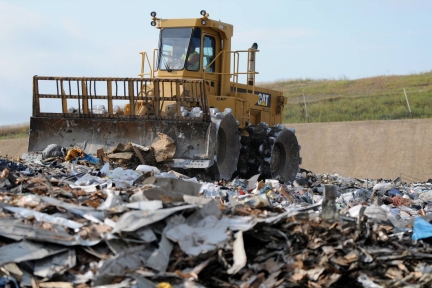
MPCA permits are required to both build and operate landfills. Operating permits specify which types of waste they can accept, such as demolition and construction debris, industrial waste, mixed municipal solid waste, and waste combustor ash. Mixed municipal solid waste is waste generated by residential, commercial, industrial, and community activities. It does not include auto hulks, street sweepings, ash, construction debris, mining waste, sludges, tree and agricultural wastes, tires, lead acid batteries, motor and vehicle fluids and filters, and other materials collected, processed, and disposed of as separate waste streams.
In Minnesota, landfills are the least-preferred waste-disposal option, in part because they must be monitored and managed in perpetuity to protect the environment and human health.
Dumps
The MPCA defines "dumps" as landfills that never held a valid permit from the agency. Before the MPCA's landfill-permitting program was established in the 1960s, people often disposed of garbage by dumping it in pits, ravines, or wetlands. Minnesota has about 1,800 old unpermitted mixed municipal solid waste sites. MPCA studied these dumps to get a better understanding of their environmental and economic impacts.
Some old dumps have leached pollution into nearby soils and bodies of water, threatening groundwater and other natural resources. The MPCA may work with stakeholders to investigate and clean up the contamination at these former dumps.
Construction and demolition landfills
Many Minnesota landfills that accept construction and demolition debris were constructed at a time when they didn't require linings. But moisture and stormwater that percolate through debris (leachate) in unlined landfills can carry pollutants from the waste into the surrounding soil and contaminate groundwater. MPCA monitoring shows that groundwater near unlined demolition landfills in Minnesota is contaminated:
The MPCA plans to amend existing Minnesota rules to address the effect of unlined construction and demolition debris landfills on groundwater.
The MPCA is prioritizing the investigation of contamination at construction and demolition debris landfills based on environmental risk.
Certificate of need
Certificate of Need is a process where MPCA offers landfills the opportunity to expand their existing capacity.
The MPCA initiated a certificate of need process for Twin Cities metro-area landfills in 2020.
Coal ash
Landfills and slurry ponds that accept coal ash for disposal (also called “coal combustion residuals”) produced by electricity-generating stations are subject to federal design, reporting, monitoring, operation, remediation, and closure requirements. The EPA regulation relies on facilities reporting on coal-ash disposal. The regulations allow citizens to sue facility owners that they believe are violating the requirements.
Guidance for landfill operators
- Under review: Guidance for leachate recirculation at municipal solid waste landfills (w-sw5-08)